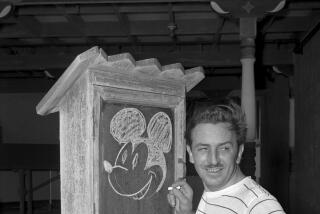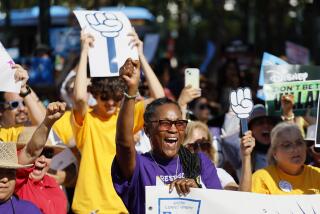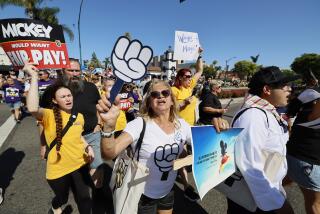Fantasizing Disneyland as a Laboratory of the Mind
Ever thought office politics are Mickey Mouse? Well, you may be right.
According to management professor John Van Maanen, there’s as much scheming and plotting at the Magic Kingdom as at any corporate bastion.
That’s just one of the revelations heard Monday by academicians and business managers who gathered in Anaheim for the four-day annual meeting of the Academy of Management. About 3,000 professionals are attending the conference to participate in 370 workshops.
“It’s the major yearly gathering” for professors and practitioners of management, said Lyman Porter, a professor at the UC Irvine Graduate School of Management. “All the recent research findings are reported.”
Topics on the agenda range from the impact of mergers on managers to jazz as a process of organizational innovation to social responsibility in show business, a talk given by TV host Bob Barker.
And where else but in Orange County--at the Disneyland Hotel, no less--would those experts gather to hear panelists talk about “Emotional Reactions to a Disneyland Visit” and “Whistle While You Work: Peer Culture at Disneyland”?
For the two-hour Disney session, the park was dissected, scrutinized and even psychoanalyzed.
Some of the findings? Well, while Disneyland bills itself as the happiest place on earth, somewhere there may be a Mad Hatter teacup operator fuming over not being promoted to the Haunted House.
Van Maanen, a professor at the Massachusetts Institute of Technology, said Fantasyland politics are strangely similar to real life. That means a real pecking order--that even an IBM would envy--exists among tour guides, ride operators, “proletariat” street sweepers and “sub-proletariat” workers who flip hamburgers and hand out lemonade from concession stands.
“There’s envy among the ride operators,” said Van Maanen, who once worked as a Jungle Cruise captain at the amusement park. “The tour guides almost never talk to the sweepers and the food servers.”
(Park spokesman Joe Aguirre denied that Disneyland has such a hierarchy.)
But if the guy behind the goofy smile is miserable, at least the patrons are having a good time. Maybe.
According to a Stanford University professor, having a good time at Disneyland is not what counts, but rather thinking that you had a good time. People tend to recall pleasant things, said Robert Sutton, an associate professor.
People know they should enjoy Disneyland, so the theory goes. So your memory--and your photo album--may be playing tricks on you by letting you forget the sometimes-interminable lines, scorching weather and less-than-magical food, Sutton said.
That’s why the park loans cameras to patrons without charge.
“Photographs can make an emotional experience more enjoyable,” Sutton said. “That’s why it’s important for Disneyland to sell Mickey Mouse statues--so people can remember the pleasant aspects and go back to Disneyland.”
Over and over again.
More to Read
Inside the business of entertainment
The Wide Shot brings you news, analysis and insights on everything from streaming wars to production — and what it all means for the future.
You may occasionally receive promotional content from the Los Angeles Times.










